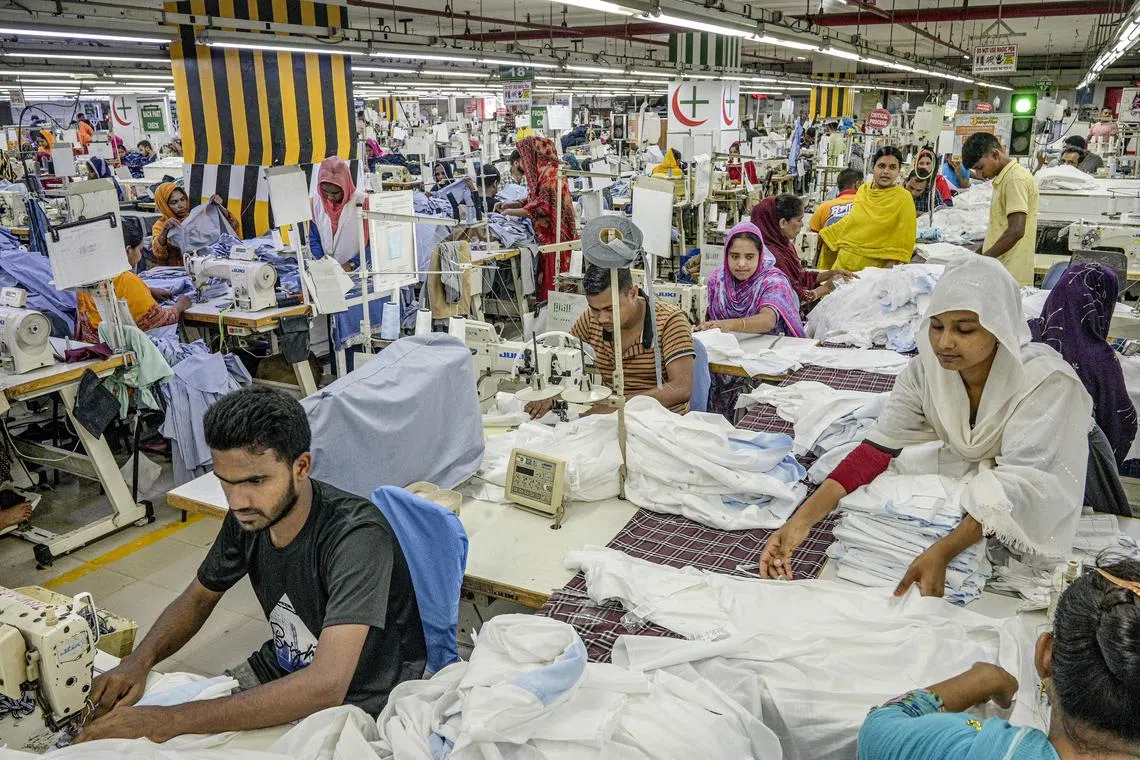Bangladesh garment factories reopen after unrest
Sign up now: Get insights on Asia's fast-moving developments

The garment industry generates $67 billion in yearly export revenue for Bangladesh.
PHOTO: NYTIMES
DHAKA – Garment factories and banks reopened in Bangladesh on July 24 after the authorities eased a curfew imposed to contain deadly clashes sparked by student protests against civil service employment quotas.
Last week’s violence
Thousands of troops are patrolling cities around the South Asian country to keep order, and most Bangladeshis remain without internet nearly a week after a nationwide shutdown was imposed.
But with calm returning to the streets after several days of unbridled mayhem, the country’s economically vital textile factories resumed operations after government clearance.
“We were worried about the future of our company,” 40-year-old factory worker Khatun, who gave only one name, told AFP.
Despite the disruption, Ms Khatun said she supported the demands of student protesters to reform government hiring rules and was shocked by last week’s violence.
“The government should implement all their demands,” she said. “A lot of them were killed. They sacrificed for future generations.”
The garment industry generates US$50 billion (S$67 billion) in yearly export revenue for Bangladesh, employing millions of young women to sew clothes for H&M, Zara, Gap and other leading international brands.
A spokesperson for the Bangladesh Garment Manufacturers and Exporters Association told AFP that garment factories had resumed business “across the country”.
Home Minister Asaduzzaman Khan agreed to exempt textile workers from the ongoing curfew to allow them to return to work, the spokesperson said.
The curfew was eased on July 24 to allow some commerce to resume but remains in effect for most Bangladeshis for 19 hours each day.
Banks, the stock exchange in the capital Dhaka, and some government offices also opened between 10am and 3pm to match the daily break in the stay-home order, government spokesman Shibli Sadiq told AFP.
The student group, which led the protests, has suspended demonstrations until at least July 26, with one leader saying they had not wanted reform “at the expense of so much blood”.
The police have arrested at least 2,500 people
Ms Hasina’s government says the stay-home order will be relaxed further as the situation improves.
With around 18 million young people in Bangladesh out of work, according to government figures, the June reintroduction of the quota scheme – halted since 2018 – deeply upset graduates facing an acute jobs crisis.
Critics say the quota is used to stack public jobs with those loyal to Ms Hasina’s Awami League.
The Supreme Court on July 21 cut the number of reserved jobs
Ms Hasina, 76, has ruled the country since 2009 and won her fourth consecutive election in January after a vote without genuine opposition. Her government is also accused by rights groups of misusing state institutions to entrench its hold on power and stamp out dissent, including by the extrajudicial killing of opposition activists. AFP


